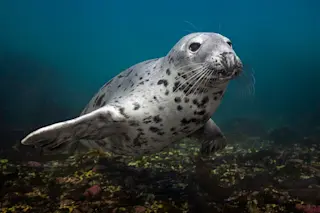If you could choose one superpower from the animal kingdom, many people might wish for the ability to breathe underwater. Marine ecosystems have long fascinated humans, leading to the development of specialized equipment and techniques to extend the time spent exploring beneath the waves. Unlike humans, marine mammals have evolved remarkable adaptations that allow them to hold their breath for extended periods, enabling them to thrive in aquatic environments.
It was traditionally believed that mammals, including marine species, rely on rising carbon dioxide (CO2) levels in their blood to signal when they need to breathe. This is because oxygen levels are not directly perceptible to the brain.
However, a recent study published in Science by researchers from the Sea Mammal Research Unit at the University of St. Andrews in Scotland has revealed that wild seals possess a unique ability: they actually can directly sense their own blood-oxygen levels.
Freediving and Seals Underwater
The deep dive into this research was inspired by lead author Chris McKnight’s interest in elite freedivers — athletes who push the limits of human breath-holding capabilities in disciplines based on depth, time, and distance. Competitive freediving is strictly regulated to prevent accidents, yet blackouts caused by oxygen deprivation (hypoxic syncope) still occur.
While an average person can hold their breath for 30 to 90 seconds, trained freedivers can extend this to between 3 and 10 minutes. Through his work with these athletes, McKnight witnessed several blackouts, which occur when the body lacks sufficient oxygen.
In an interview on the Science Podcast, McKnight explained that freedivers lose consciousness because their bodies rely on CO2 levels to dictate when to surface. The urge to breathe, the so-called air hunger, is primarily driven by increasing CO2 rather than decreasing oxygen levels.
However, when it comes to seals — animals capable of holding their breath for over an hour — he suspected they might use a different strategy. His hypothesis was that seals must possess a sensory mechanism that directly detects oxygen levels rather than relying on CO2, as oxygen is the gas critical for survival.
Read More: Are Leopard Seals as Dangerous as You Think?
Seals Respond Directly to Oxygen Levels
Testing this hypothesis in wild seals proved far more challenging than studying human freedivers. To conduct their research, McKnight and his team brought six juvenile wild-caught grey seals (Halichoerus grypus) into the Sea Mammal Research Unit. The seals were trained to participate in a simulated foraging task, swimming between a controlled breathing chamber and an underwater feeding station.
This experimental setup allowed the researchers to manipulate the seals’ inhaled oxygen and CO2 levels while monitoring their diving behavior. The results challenged previous assumptions: the duration of the seals' dives was closely linked to their blood-oxygen levels, whereas elevated CO2 had little to no effect on how long they stayed submerged.
The researchers found that even when the seals were subjected to CO2 levels far exceeding those in the natural environment, their dive durations remained consistent. In contrast, when oxygen concentrations were adjusted — whether increased or reduced — there was a noticeable change in how long the seals stayed submerged. This suggests that their ability to regulate breath-holding is primarily governed by oxygen levels rather than CO2 buildup.
An Evolutionary Advantage
In contrast to humans, whose breath-holding capacity is dictated by CO2 levels, seals appear to have a cognitive ability to perceive oxygen levels directly. This allows them to regulate their dives more efficiently and avoid dangerous oxygen depletion.
McKnight explained this from an evolutionary perspective, "If marine animals experienced blackouts like freedivers do, they would not survive in the wild. Evolution would have strongly selected against such vulnerability, particularly in species that transitioned from terrestrial to fully aquatic lifestyles. A faulty gas perception system simply would not be sustainable."
Given that similar diving adaptations have evolved independently in various marine mammal species, it is likely that other diving animals also possess this unique ability to monitor their own oxygen levels directly.
Read More: Seals Caught on Film Clapping in the Wild for the First Time Ever
Article Sources
Our writers at Discovermagazine.com use peer-reviewed studies and high-quality sources for our articles, and our editors review for scientific accuracy and editorial standards. Review the sources used below for this article:















